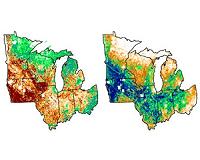 |
Rome (AFP) Oct 26, 2010 The genetic diversity of the plants that we grow and eat could be lost forever due to climate change, threatening future food security, the UN's Food and Agricultural Organisation (FAO) said on Tuesday. Experts from the Rome-based organisation warned that the loss of biodiversity will have a major impact on humankind's ability to feed itself in the future as the global population rises to nine billion by 2050. "There are thousands of wild crop relatives that... hold genetic secrets that enable them to resist heat, droughts, salinity, floods and pests," FAO director general Jacques Diouf was quoted in the report as saying. "Increasing the sustainable use of plant diversity could be the main key for addressing risks to genetic resources for agriculture," he said. The report estimated that 75 percent of crop diversity was lost between 1900 and 2000 and called for "special efforts to conserve and use" both cultivated plants and their "wild" relatives, especially in developing countries. Fifty percent of the increase in crop yields in recent years has come from new seed varieties, the report said. FAO experts pointed in particular to the success of New Rice for Africa (NERICA), a cultivator of new types of rice suited to drylands that has transformed local economies in several parts of Africa. The FAO's second report in 12 years on the state of the world's plant genetic resources covers a range of topics from gene bank collections to the effects of climate change. The study predicts that as much as 22 percent of the wild relatives of important food crops of peanut, potato and beans will disappear by 2050 because of the changing climate. The United Nations has named 2010 as the International Year of Biodiversity.
Share This Article With Planet Earth
Related Links Farming Today - Suppliers and Technology
 Brazil says UN biodiversity summit needs biopiracy deal
Brazil says UN biodiversity summit needs biopiracy dealNagoya, Japan (AFP) Oct 26, 2010 Brazil's environment minister warned Tuesday that UN talks on biodiversity hinged on a deal being reached to stop genetic resources and knowledge being plundered in developing countries. Izabella Teixeira said securing a binding pact on ending "biopiracy" was imperative if there was to be a broader treaty at the talks, which are being held in Japan this week, to slow the mass extinction of s ... read more |
|
| The content herein, unless otherwise known to be public domain, are Copyright 1995-2010 - SpaceDaily. AFP and UPI Wire Stories are copyright Agence France-Presse and United Press International. ESA Portal Reports are copyright European Space Agency. All NASA sourced material is public domain. Additional copyrights may apply in whole or part to other bona fide parties. Advertising does not imply endorsement,agreement or approval of any opinions, statements or information provided by SpaceDaily on any Web page published or hosted by SpaceDaily. Privacy Statement |